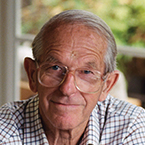
Frederick Sanger, PhD, an inaugural Fellow of the AACR Academy, died Nov. 19, 2013, at the age of 95. Sanger, professor emeritus in the laboratory for molecular biology at the University of Cambridge, U.K., was the only two-time Nobel laureate in chemistry and one of only four individuals to receive more than one Nobel Prize.
Sanger received his first Nobel Prize in Chemistry in 1958 for his work on the structure of proteins, especially that of insulin. He shared half of the 1980 Nobel Prize in Chemistry with Walter Gilbert; the prize recognized their contributions concerning the determination of base sequences in nucleic acids. Sanger’s sequencing technology is used daily in laboratories worldwide to sequence genomes, define cancer biomarkers, establish the genetic mutations responsible for diseases including cancer, and perform patient-based genetic profiling to better direct established disease treatments.
Born Aug. 13, 1918, in Rendcombe, Gloucestershire, U.K., Sanger received his doctorate from the University of Cambridge in 1943. In addition to receiving two Nobel Prizes, Sanger has been honored with numerous accolades throughout his career, including the Commander of the Order of the British Empire; the Royal Medal and the Copley Medal from the Royal Society, London; fellow of the Royal Society; the Order of Merit (the Commonwealth); the Albert Lasker Award for Basic Medical Research; the G.W. Wheland Medal from the University of Chicago; the Louisa Gross Horwitz Prize; and the Gairdner Foundation International Award.
Most recently, the AACR named Sanger a Fellow of the AACR Academy at its Annual Meeting 2013. He was among 106 individuals elected to this first class of fellows, which was created to recognize and honor distinguished scientists whose contributions have propelled significant innovation and progress against cancer.
Career Highlights
1994 ABRF Annual Award, Association of Biomolecular Resource Facilities Award
1986 Order of Merit (Commonwealth)
1980 Nobel Prize in Chemistry
1979 Louisa Gross Horwitz Prize
1979 Albert Lasker Award for Basic Medical Research
1978 G.W. Wheland Medal, University of Chicago
1977 Copley Medal, Royal Society, London
1976 William Bate Hardy Prize, Cambridge Philosophical Society
1971 Gairdner Foundation International Award
1969 Royal Medal, Royal Society, London
1963 Commander of the Order of the British Empire
1958 Nobel Prize in Chemistry
1954 Elected Fellow, Royal Society, London
1951 Corday-Morgan Medal
1943 PhD, Cambridge University